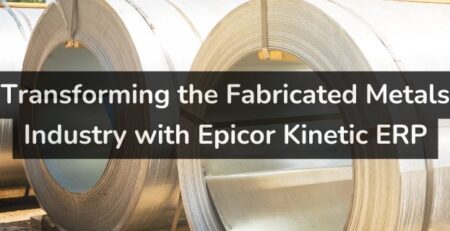In Southeast Asia’s dynamic manufacturing landscape, staying ahead of the competition requires more than skilled workers and advanced machinery. For plant managers and CFOs, technology-driven operational efficiency is paramount. One solution leading the way is Epicor ERP, a robust enterprise resource planning system designed to streamline processes, improve productivity, and maximize profitability.
Here’s how Epicor ERP is improving manufacturing productivity for companies in the region:
1. Streamlined Production Management
Epicor ERP enables manufacturers to have end-to-end visibility of their production processes. From inventory management to scheduling, the system ensures that every resource is optimally utilized.
- Dynamic Scheduling: Plan, adjust, and optimize production schedules in real-time to avoid bottlenecks.
- Minimized Downtime: Track machinery performance and maintenance schedules to reduce unexpected interruptions.
For factory directors, this means improved operational flow, while CFOs see cost reductions through better resource allocation.
2. Data-Driven Decision-Making
Epicor ERP integrates real-time data collection across all manufacturing processes, providing actionable insights for better decision-making.
- Advanced Analytics: Identify production inefficiencies and resolve them proactively.
- Financial Clarity: CFOs can leverage detailed financial reports to monitor spending and align budgets with production goals.
This comprehensive data visibility fosters informed strategies, enhancing productivity and profitability across the board.
3. Enhanced Supply Chain Efficiency
Managing supply chains in Southeast Asia, with its mix of local and international suppliers, can be complex. Epicor ERP simplifies supply chain operations by integrating procurement, inventory, and logistics processes.
- Just-in-Time Inventory: Maintain optimal stock levels to avoid overproduction or material shortages.
- Supplier Collaboration: Ensure seamless communication and coordination with suppliers, reducing delays.
For both factory directors and CFOs, this translates into better production flow and significant cost savings.
4. Regulatory Compliance and Sustainability
Manufacturers in Southeast Asia face increasing pressure to comply with local regulations and adopt sustainable practices. Epicor ERP helps businesses meet these demands seamlessly.
- Automated Compliance Tracking: Stay up-to-date with evolving local laws and industry standards.
- Sustainability Metrics: Measure energy use, waste, and emissions, enabling factories to align with global environmental goals.
By ensuring compliance and sustainability, manufacturers not only meet legal requirements but also enhance their reputation, a crucial factor in attracting global partners.
5. Scalability to Support Growth
Southeast Asia is witnessing rapid industrial expansion. Epicor ERP is built to grow alongside your business, whether you’re expanding to new locations or scaling up production capacity.
- Customizable Modules: Add functionalities tailored to your specific manufacturing needs.
- Multi-Site Management: Monitor and manage operations across different factories from a centralized platform.
This flexibility empowers CFOs to forecast future investments confidently, while factory directors can focus on driving operational growth.
Why Choose Epicor ERP for Southeast Asian Manufacturers?
Southeast Asia’s manufacturing sector is diverse, fast-paced, and competitive. Epicor ERP, with its tailored solutions for manufacturing businesses, ensures companies can thrive in this environment by boosting productivity, reducing costs, and enhancing decision-making capabilities.
At Data V Tech, we specialize in implementing and customizing Epicor ERP to meet the unique needs of manufacturers in Southeast Asia. Our team of experts ensures a smooth transition, helping your business achieve peak productivity.
Ready to Transform Your Manufacturing Operations?
Contact us today to learn how Epicor ERP can elevate your factory’s productivity and profitability. Together, we’ll ensure your business remains a leader in Southeast Asia’s competitive manufacturing landscape.












